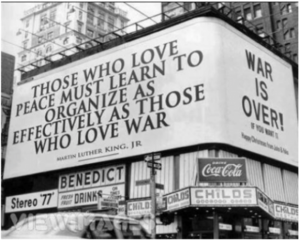
If only there were an industry of businesses that manufactured goods and services specifically geared to maintaining the peace (something more profitable and focused than libraries). Then there would be a weighty lobby to counterbalance the military-industrial complex. This Peace Lobby could sponsor NFL half-time shows. Instead of showing pretty photos of missiles taking off, they could show what happens to human beings when those missiles land. And they could sponsor research to explore the extent to which U.S. articulates meaningful objectives regarding its wars and also set forth detailed metrics to show whether U.S. wars actually achieve those objectives, using (as one example) the 20-year war in Afghanistan.
They could investigate the extent to which the U.S. government has been honest with the citizens regarding the need for each war. They could have teams of analysts assess the risks and benefits of going to war or not going to war. They could warn us that many media outlets uncritically and gullibly join in whenever politicians beat the drums to go to war. They could also explore the effect on diverting massive U.S. tax resources to war, and they could run campaigns showing the lost benefits of failing to spend those tax resources on peaceful uses, such as decaying U.S. infrastructure. They could also educate Americans of the dangers of the sunk cost fallacy.
Related Thought: If only were were better incentives for Hollywood to produce storylines where war was averted. Unfortunately, scripts permeated with visual violent conflict sells, especially visual conflict involving physical fighting. I wonder about the filtering that likely occurs when Hollywood script-writers and producers want the cooperation of of the military to use military resources in their movies (e,g., military hardware and access to military ships, planes and bases). If only we had the following data: How often does the U.S. military turn down cooperation of a movie-maker because the script puts the military in a bad light or makes war look like a bad idea?

